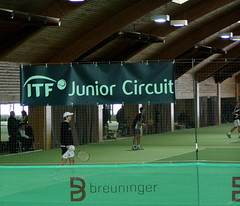An Inside Look at the Brain of a Champion by Vic Braden
An Inside Look at the Brain of a Champion by Vic Braden
This column originally appeared in the February issue of Florida Tennis magazine. Publisher Jim Martz and author Vic Braden gave me permission to reprint it (that doesn't sound right given the website format, does it?), and I think it contains many insights pertinent to those interested in player development on the junior level.
I've been spending a great deal of time these last few years trying to determine what makes a champion and whether we can predict that one has the potential to be an international champion.
I have had discussions with neuroscientists, a brain typist, a tennis playing psychiatrist who has done more than 28,000 brain scans, famous coaches and pro players. The bottom line is that there has been progress in understanding how a champion's brain works, but there are still many unanswered questions.
I have to go back to my years of assisting with the management of pro tours. I'm currently archiving 50 years of film, over 30 years of video and about 40 years of audio tapes. I find that today's champions seem to think like the champions from 50 years ago. However, this is not based upon brain scans, but anecdotal records. So, what are the similarities?1. The champions have had a goal of becoming a big-time winner at a relatively early age.
2. There also was nothing that seemed to be able to deter them from reaching their goal.
3. They were keen analysts when observing the strengths and weaknesses in potential opponents.
4. They seemed to have the ability to analyze their own game accurately.
5. They seemed to be able to analyze quickly when they were getting the right information from coaches.
6. When most players were calling it a day on the practice court, future champions were just getting warmed up.
7. Champions talked more about hating to lose than basking in the glory of victories.
8. The top players seemed to have a unique ability to focus on execution in tight situations rather than worrying about the outcome of the point, or the match.
9. Champions seemed to enjoy the pressure of tiebreakers rather than fearing it.
10. Champions gave away nothing: they would beat an injured player as fast as they could.
When Lleyton Hewitt was down a match point in the 2004 Pacific Life Open, I asked him if he was afraid. He said, "If he beats me, he's going to have to hit one hell of a shot to win."
In a video I produced with Pancho Segura and Jack Kramer, Pancho told the story about how Bobby Riggs was injured and Jack Kramer showed no mercy and beat Bobby 6-0, 6-1. Kramer said, "Don't show mercy to anyone. Beat every opponent as badly as possible, and if you like them, take them to lunch."


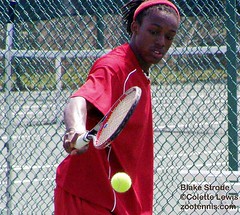 at Arkansas and Adam Slagter
at Arkansas and Adam Slagter 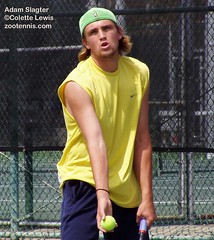 at Penn State. Justin Kronauge's defensive lob will keep him in lots of points he will eventually win and Clint Bowles and his drop shot are going to confound many a junior opponent in the next two years. Reid Carleton, who won seven matches in the consolations, just turned sixteen, but can already play with the big boys. If he plays 16s in Kalamazoo this year, he'll be heard from.
at Penn State. Justin Kronauge's defensive lob will keep him in lots of points he will eventually win and Clint Bowles and his drop shot are going to confound many a junior opponent in the next two years. Reid Carleton, who won seven matches in the consolations, just turned sixteen, but can already play with the big boys. If he plays 16s in Kalamazoo this year, he'll be heard from.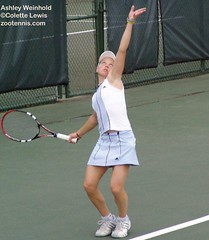 Ashley Weinhold, who lost to Burdette in the quarterfinals, pronouncing them athletic--a compliment of the highest order from Doug.
Ashley Weinhold, who lost to Burdette in the quarterfinals, pronouncing them athletic--a compliment of the highest order from Doug.

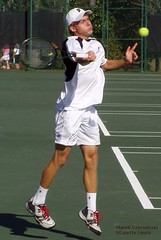 took the court against his longtime doubles partner, third seed Maciek Sykut. "It's always tough," said Czerwinski after his 6-3, 7-6(6) win. Sykut had opportunities, breaking Czerwinski to serve for the set at 6-5, but he failed to convert any of his three set points in that game and two more in the tiebreaker.
took the court against his longtime doubles partner, third seed Maciek Sykut. "It's always tough," said Czerwinski after his 6-3, 7-6(6) win. Sykut had opportunities, breaking Czerwinski to serve for the set at 6-5, but he failed to convert any of his three set points in that game and two more in the tiebreaker. 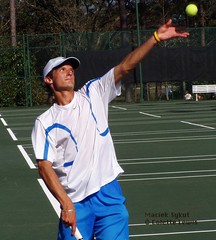
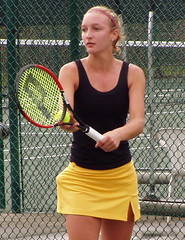
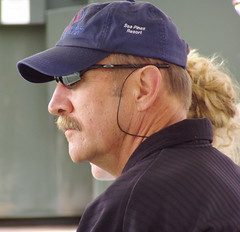 she needed only three of them, finally eliciting a forehand error from Bresson that produced a spirited "c'mon" from Smith and a collective exhalation from the crowd. The 13th seeded lefthander from Hilton Head then faced a well-rested quarterfinal opponent Eleanor Peters, who had completed her fourth round match on Sunday, and Smith was unable to clear that hurdle, dropping a 6-4, 6-4 decison to the sixth seed.
she needed only three of them, finally eliciting a forehand error from Bresson that produced a spirited "c'mon" from Smith and a collective exhalation from the crowd. The 13th seeded lefthander from Hilton Head then faced a well-rested quarterfinal opponent Eleanor Peters, who had completed her fourth round match on Sunday, and Smith was unable to clear that hurdle, dropping a 6-4, 6-4 decison to the sixth seed.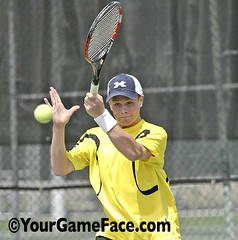
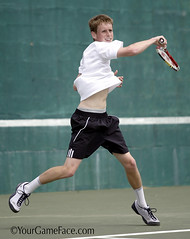 Kronauge, who won the USTA Boys 18 Winter National title in January, applied steady pressure during long baseline rallies, but was unable to shake the determined Koenke. Though Koenke was broken at love in the eighth game of the final set, Kronauge could not serve it out. But after holding for 6-5, the 17-year-old from Ohio finally earned two match points, only to see those evaporate when Koenke produced a service winner, then coaxed an error. On his third chance, however, Kronauge prevailed, and just in time too, as the skies opened and play did not resume on Sunday.
Kronauge, who won the USTA Boys 18 Winter National title in January, applied steady pressure during long baseline rallies, but was unable to shake the determined Koenke. Though Koenke was broken at love in the eighth game of the final set, Kronauge could not serve it out. But after holding for 6-5, the 17-year-old from Ohio finally earned two match points, only to see those evaporate when Koenke produced a service winner, then coaxed an error. On his third chance, however, Kronauge prevailed, and just in time too, as the skies opened and play did not resume on Sunday.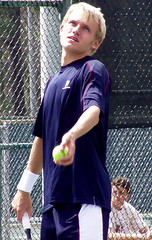 When Czerwinski finally emerged with a 6-7(5), 6-1, 6-4 win, he was relieved and happy.
When Czerwinski finally emerged with a 6-7(5), 6-1, 6-4 win, he was relieved and happy.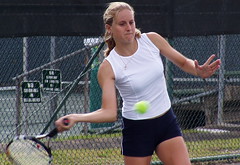 beat Caitlin Baker 6-1, 6-1 and boys top seed Marek Czerwinski of Birmingham MI also advanced in straight sets. The highest seed to fall on Friday was fifth seed Kallim Stewart who was eliminated by Christopher Cloer.
beat Caitlin Baker 6-1, 6-1 and boys top seed Marek Czerwinski of Birmingham MI also advanced in straight sets. The highest seed to fall on Friday was fifth seed Kallim Stewart who was eliminated by Christopher Cloer.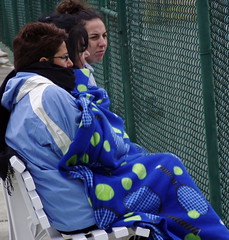 who sat through an entire match without running to the pro shop for a dose of heat.
who sat through an entire match without running to the pro shop for a dose of heat.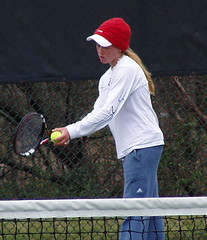 The fifteen year old from Austin Texas had no trouble with the 21st seed, beating Elyse Steiner 6-2, 6-1.
The fifteen year old from Austin Texas had no trouble with the 21st seed, beating Elyse Steiner 6-2, 6-1.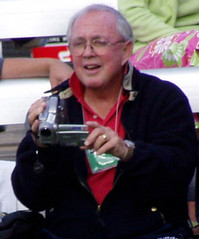 he explained to me his theory about genetics and net-rushing, and the research he is conducting on the issue.
he explained to me his theory about genetics and net-rushing, and the research he is conducting on the issue. 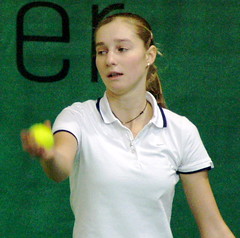 Although she is a statuesque 5’8”, her game is not classically “big babe”, what with her mediocre serve and not particularly punishing ground strokes. But she knows how to construct points, and as most left-handers before her, she has mastered the art of short angles. She is deceptively quick and can turn a sure winner into one of the best defensive lobs you’ve ever seen. But what really wowed me this weekend was her anticipation, a sixth sense that told her to cover the crosscourt, or to hit her shot where her opponent surely wasn’t. She didn’t lose a set in the tournament and though the field wasn’t particularly strong, she is undoubtedly gaining confidence with every win. She didn’t play the Australian Juniors, but I’m eager to see her in the next three Grand Slams.
Although she is a statuesque 5’8”, her game is not classically “big babe”, what with her mediocre serve and not particularly punishing ground strokes. But she knows how to construct points, and as most left-handers before her, she has mastered the art of short angles. She is deceptively quick and can turn a sure winner into one of the best defensive lobs you’ve ever seen. But what really wowed me this weekend was her anticipation, a sixth sense that told her to cover the crosscourt, or to hit her shot where her opponent surely wasn’t. She didn’t lose a set in the tournament and though the field wasn’t particularly strong, she is undoubtedly gaining confidence with every win. She didn’t play the Australian Juniors, but I’m eager to see her in the next three Grand Slams.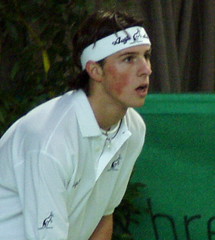 Against 3rd seed Jochen Schottler in the semis, Arnaboldi was down a set and two breaks, but won the match with a strategy change. Up three love, Schottler began to dissolve in an unforced error concoction that Arnaboldi prepared for him. By denying the German the pace he craved, Arnaboldi deftly softballed and sliced his way to a three set victory. For a moment there, I flashed back to Brad Gilbert in his prime. That sort of win is not going to make agents drool or sponsors flock, but it shows imagination, maturity and a comprehension of the game that is rare anywhere, and rarer still in junior tennis.
Against 3rd seed Jochen Schottler in the semis, Arnaboldi was down a set and two breaks, but won the match with a strategy change. Up three love, Schottler began to dissolve in an unforced error concoction that Arnaboldi prepared for him. By denying the German the pace he craved, Arnaboldi deftly softballed and sliced his way to a three set victory. For a moment there, I flashed back to Brad Gilbert in his prime. That sort of win is not going to make agents drool or sponsors flock, but it shows imagination, maturity and a comprehension of the game that is rare anywhere, and rarer still in junior tennis.